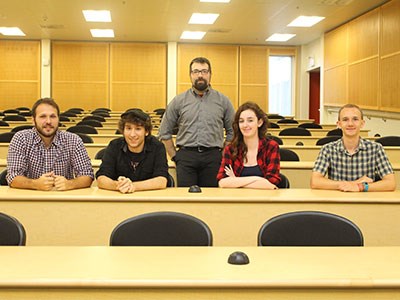When Ryan Trudeau registered with Laurentian University he was in the mechanical engineering program. But that didn’t last long.
His roommate was a computer science student and often showed Trudeau the projects from his programming courses.
Trudeau started to help his roommate with his projects and quickly caught the computer science bug.
“I found that it was a lot more rewarding immediately,” Trudeau said. “You’re working with a lot more logic systems.”
While a lot of his engineering courses dealt solely with theory, in computer science he could immediately see the results of his work by creating functional computer programs.
Trudeau became known as the “web guy” due to his skill as a coder and interest in the back-end systems that make the web an integral part of people’s lives.
In 2014, when Trudeau was beginning his third year in Laurentian’s computer science program, the department created two new specializations more senior students could choose from: game design and web data management.
Despite his interest in web design, Trudeau, who had been a lifelong gamer, opted for the game design specialization instead.
It turned out game design could open a number of doors beyond the massive video game industry.
The courses helped Trudeau learn about iterative development, where a programmer can add functionality to a base prototype.
Game design also emphasizes user experience, which applies to a number of areas in computing.
“Everything I’ve learned I can use no matter what I go into, whether it’s database or web,” Trudeau said.
It’s that flexibility that convinced Laurentian master lecturer Aaron Langille it was time to launch a game design specialization at the university.
It also helped that game design had long been on many students’ wish lists.
“When I visit the university fair one of the questions I get asked most often is, ‘Do you offer game design?’” Langille said.
He guesses about two-thirds of his students got into computer science because of video games.
Many students go on to work in other areas of information technology, but it’s often video games that spark that early interest in the field.
Langille and his colleagues built the game design specialization in such a way that students can easily transition to other fields in their careers if they decide game design isn’t for them.
The specialization is available to students once they complete their second year and have a good grasp of four or five programming languages.
Because powerful tools like the Unity and Unreal game engines already handle a lot of the complex number-crunching necessary for modern games, the specialization focuses on the philosophies around game design.
What qualities do successful games have in common? What’s the best way to monetize a game? How do you create a compelling story in a video game?
Those are just some of the questions Langille and his students attempt to answer.
Langille was also excited to bring game design to Laurentian because, unlike many other areas of computer science, it’s truly a multi-disciplinary field.
To make a good video game, you need a team that includes excellent coders, but also great artists, musicians and writers.
Thanks to online distribution methods, Langille said graduates with a video game specialization from Laurentian don’t necessarily need to move to Toronto, Montreal or Vancouver if they want to design video games.
A recent indie — or independent — games revolution has made it possible for teams of only a few people to create games that compete with million-dollar productions.




